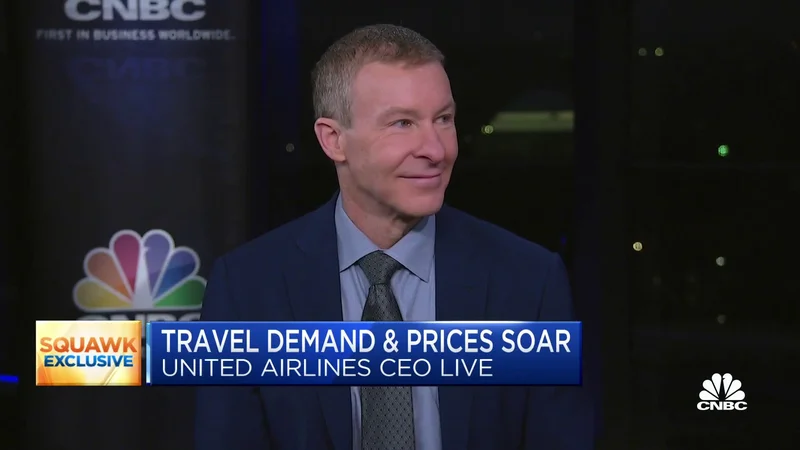Article Directory
The Aviation Duopoly Gambit: A Data Analyst's Skeptical Take
Scott Kirby, the chief executive of United Airlines, isn't one to mince words. His recent pronouncement, reverberating through the aviation world, declared that the U.S. market has "room for only two dominant, full-service airlines." He specifically targeted American Airlines and other major carriers, essentially drawing a line in the sand. It’s a bold claim, as reported in Scott Kirby American Airlines Remarks Shake Industry as United CEO Issues Bold Warning, delivered with the kind of confident assertion that sends immediate ripples through investor calls and C-suites. But when someone in Kirby's position paints such a stark picture, my first instinct, as always, is to ask: show me the data.
The scene itself, I can almost picture it: the low hum of a conference hall or the controlled environment of a high-profile interview, the subtle shift in posture from industry rivals as the `united ceo scott kirby` lays down his gauntlet. His words weren't a whisper; they were a declaration, aimed squarely at shaping perception, if not immediate reality. This isn’t just casual speculation (Kirby is known for calculated public statements). This is a strategic chess move, articulated publicly. But what analytical framework, precisely, underpins this vision of a streamlined, two-horse race?
Deconstructing the 'Two Airlines' Thesis
Kirby’s assertion, as highlighted in Scott Kirby American Airlines Remarks Shake Industry as United CEO Issues Bold Warning, that the U.S. can only sustain two dominant, full-service carriers begs a rigorous methodological critique. How does one quantify "room" in an industry as complex and dynamic as commercial aviation? Is this based on route density, passenger volume, or perhaps a more nebulous metric like market influence or network reach? Historically, the U.S. airline landscape has seen periods of intense consolidation and fierce competition, but rarely has a CEO so explicitly called for such a narrow future.

Consider the current market shares. While `American Airlines` and United are indeed major players, alongside Delta and Southwest, the idea of winnowing the field to just two seems, from a purely numerical standpoint, ambitious at best. United’s current domestic market share hovers around 16%, while American's is slightly higher, perhaps 17%—or, to be more precise, 17.3% by some recent reports. To suggest that the industry must shed roughly half of its current "major" entities to achieve an equilibrium under two banners implies a level of consolidation that would fundamentally reshape consumer choice and regulatory oversight. It feels less like a market forecast based on organic growth patterns and more like a high-stakes game of musical chairs, where Kirby is signaling that he's already secured a seat and is keen to see who gets left standing.
I've reviewed enough industry projections to know that such definitive statements often serve multiple masters. They can be a call to arms for internal teams, a signal to investors about future strategic direction, or even a subtle nudge to regulators regarding the perceived necessity of further mergers. But the crucial question, from an analytical perspective, isn't just what he said, but why now, and what data supports this specific number? If the goal is truly robust competition, why advocate for a shrinking competitive landscape? My analysis suggests that while consolidation can theoretically lead to efficiencies for the remaining players, it often comes at the expense of consumer choice and potentially higher fares. Does a duopoly truly foster innovation, or does it merely lead to price stagnation and diminished service quality, particularly in less contested routes? What market dynamics, precisely, would force this consolidation rather than, say, a more diversified competitive environment? Details on the precise analytical framework supporting Kirby's 'two dominant airlines' projection remain scarce, but the impact of the declaration is clear: it’s designed to shake things up.
The Numbers Don't Buy It
Scott Kirby's remarks are a masterclass in strategic rhetoric, designed to frame a narrative rather than merely report an observation. While the `united ceo scott kirby` certainly has a deep understanding of the industry, his declaration about a two-airline future feels more like an aspiration for market dominance than an inevitable outcome dictated by current data. From where I sit, looking at the financial filings and capacity projections, the market is far too complex, and consumer demand too varied, to be so neatly divided into just two major players without significant, potentially disruptive, external forces or regulatory enablement. This isn't a prediction; it's a play. And like any good play, its success hinges not on its initial declaration, but on the subsequent moves, and whether the market, and the regulators, decide to follow the script.
